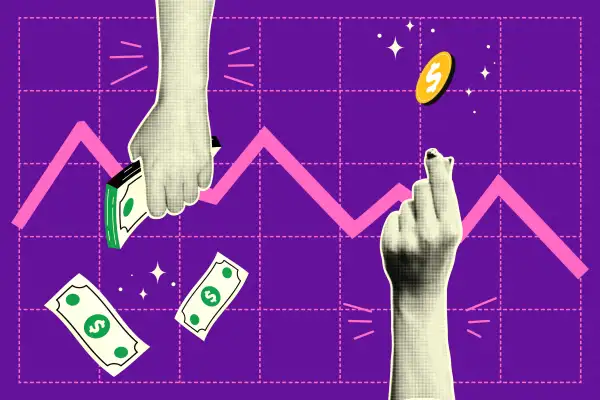3 Smart Moves for Investors After the Fed's Interest Rate Cut
Money is not a client of any investment adviser featured on this page. The information provided on this page is for educational purposes only and is not intended as investment advice. Money does not offer advisory services.

The Federal Reserve cut interest rates Wednesday for the first time since 2020 as it switched gears from battling high inflation to keeping the labor market healthy.
The half-percentage-point cut was unusually large for the central bank — it tends to move rates up or down by a quarter-percentage point — but not entirely unexpected.
Stocks initially jumped after the Fed announced its decision as investors cheered the beginning of the end of high interest rates. High rates make it more expensive for banks to borrow money, and a trickle down effect makes taking out loans more challenging for business and consumers, too. That can weigh on a company's earnings and, by extension, its stock price.
The Fed also signaled that we can expect more cuts to come later this year and into 2025. So what does this all mean for investors? Here’s what to expect, and three moves you can make to take advantage of the rate cut.
Consider cyclical and small-cap stocks
The rate cuts could be good news for stock market investors.
“Stock market returns following the first rate cut in a cycle are generally quite good if the economy avoids recession,” says Ross Mayfield, an investment strategist at Baird. Cyclical stocks in particular could get a bump from the rate cuts, he adds. Cyclical sectors are those that are more sensitive to interest rate movements and the state of the wider economy, like finance and real estate.
And while small-cap companies tend to underperform their larger counterparts during periods of rising or high interest rates due to their higher debt levels, they could start to outperform those larger companies as cheaper financing becomes available, says Timothy Chubb, chief investment officer at Girard, a Univest Wealth Division.
But investors certainly shouldn’t go all in on the financial markets with the expectation that prices are on the rise. Wall Street may view the aggressive cut as an indication that the Fed could be concerned that the economy may slow more rapidly than previously predicted, says Sam Stovall, chief investment strategist at CFRA Research. In fact, we may have seen that Wednesday afternoon, when prices gave up many of their initial gains following the Fed’s decision.
Given the great start of the year for the market, now is also a good time to broadly reevaluate your investment portfolio and take an opportunity to rebalance, Chubb says.
Stick with higher-quality bonds
Rebalancing your portfolio should include reviewing your mix of bonds, which are essentially loans you make to an issuer like the government or a company. Bonds could jump in value since investors will want the bonds issued at the higher interest rates from before the Fed cut rates.
But Chubb says to beware of investing in riskier bonds down the credit spectrum — basically, those that come with more risk that an issuer won’t make good on their loan. Those bonds could be in trouble if the economy does slide into a downturn.
His firm favors sticking with higher-quality bonds, which tend to have a lower risk of default. Those bonds usually offer lower interest rates but greater security.
Put your cash to work
Investors have gotten used to being rewarded for keeping their money in high-yield savings accounts and other cash alternatives. But banks tend to quickly follow in the footsteps of the Fed when it comes to setting interest rates on their products.
Investors should expect yields on money market funds and other short-term, fixed income-like products to come down as the Fed continues to cut rates, Mayfield says. Those who have become accustomed to yields of 5% or more on cash in recent years might benefit from reallocating their money if it’s not needed in the near future.
While taking your hard-earned cash and putting it in the more risky stock market may make you anxious, it typically pays off. The market’s annualized average return has historically been around 10%, and investing for the long-term is seen as one of the most effective ways to becoming a millionaire.
But if your investing strategy doesn’t offer you enough risk tolerance to put your money in stocks — maybe you’re nearing retirement, or have a big purchase like a house on the horizon — there are still smart ways to take advantage of the rate cuts.
“If you have cash available that you won’t need for several years, you can consider a longer-term CD at this point to lock in higher rates,” says Catherine Valega, financial advisor and founder of Green Bee Advisory. CDs, or certificates of deposit, require you to lock up your funds for a certain amount of time (usually three months to five years) but they also guarantee you the agreed upon interest rate, no matter what the Fed does next.
Remember, if you didn’t lock in rates before Wednesday, “it’s not the end of the world,” Valega adds. Rates won’t immediately go to zero; they’ll just decline slightly.
More from Money:
60% of Investors Are Making This Mistake Ahead of the Presidential Election
This Stock Market Stat Has Predicted 83% of Presidential Elections in the Past Century
Grocery Stores Have Hiked Prices Beyond Inflation — and Their Stocks Are Soaring

